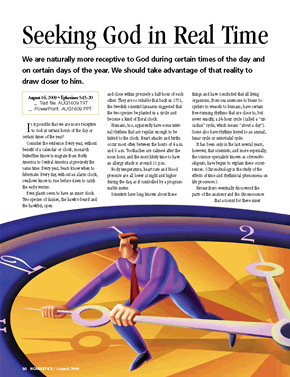
Seeking God in Real Time
| Ephesians 5:15-20
Kairos. It’s in this text. But new discoveries in the field of chronobiology — the study of the effects of time and rhythmical phenomena on life processes — suggest that perhaps we should slow down and take another look.
Is it possible that we are more receptive to God at certain hours of the day or certain times of the year?
Consider the evidence: Every year, without benefit of a calendar or clock, monarch butterflies know to migrate from North America to Central America at precisely the same time. Every year, bears know when to hibernate. Every day, without an alarm clock, swallows know to rise before dawn to catch the early worms.
Even plants seem to have an inner clock. Two species of daisies, the hawk’s-beard and the hawkbit, open and close within precisely a half-hour of each other. They are so reliable that back in 1751, the Swedish scientist Linnaeus suggested that the two species be planted in a circle and become a kind of floral clock.
Humans, too, apparently have some internal rhythms that are regular enough to be linked to the clock. Heart attacks and births occur most often between the hours of 4 a.m. and 6 a.m. Toothaches are calmest after the noon hour, and the most likely time to...
Start today. Cancel any time.
Act now and, for just $7.99 a month or $69.95 a year, you’ll receive a full year of this valuable sermon preparation resource.
Our convenient, continuous-subscription program ensures you'll never miss out on the inspiration you need, when you need it.
You’re never obligated to continue. Naturally, you may cancel at any time for any reason, no questions asked.